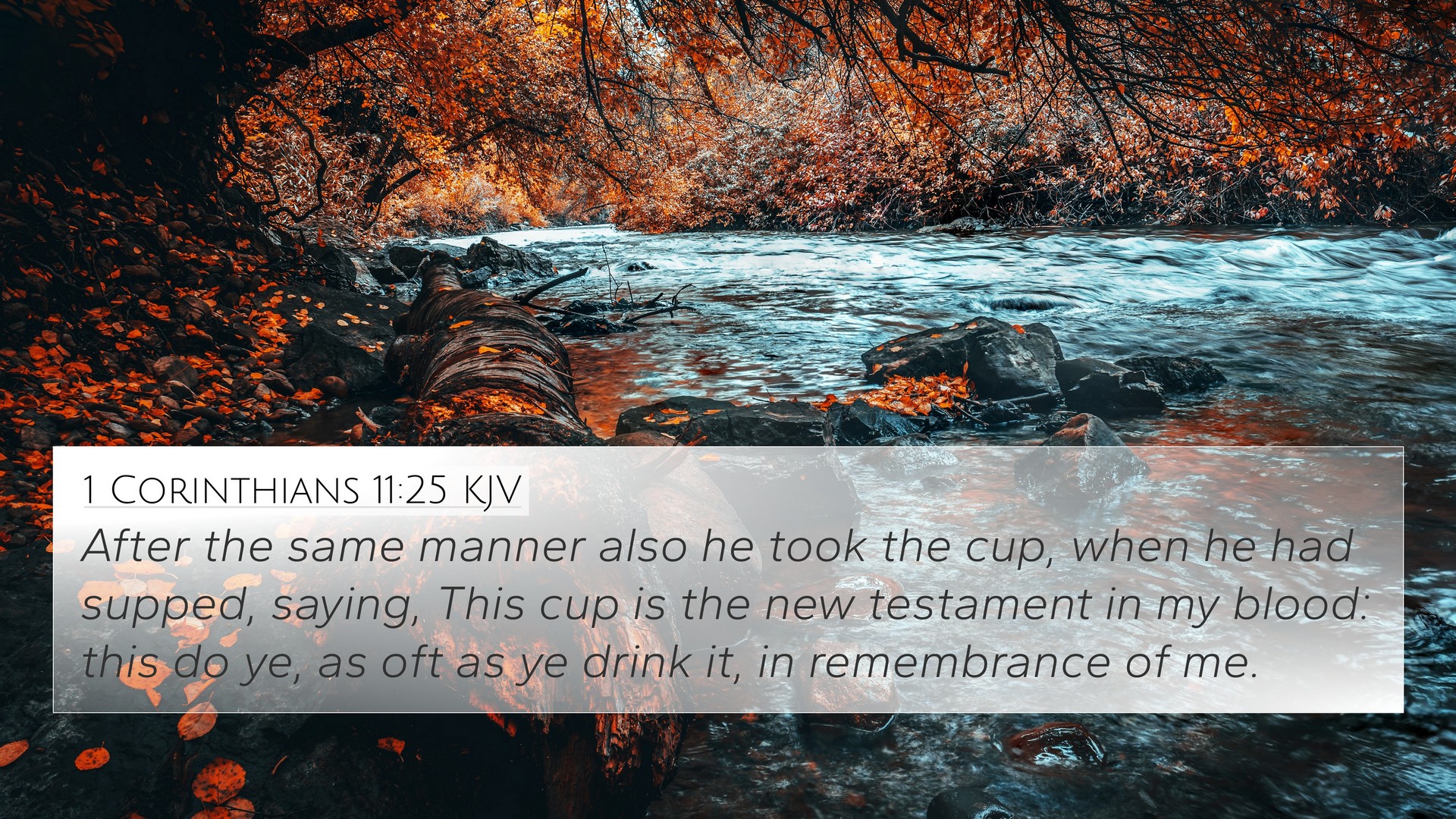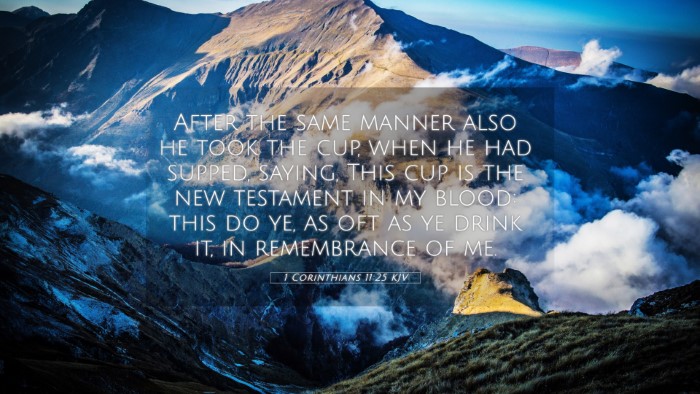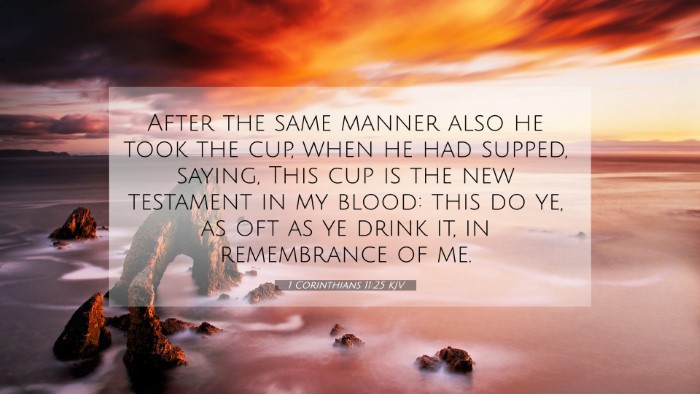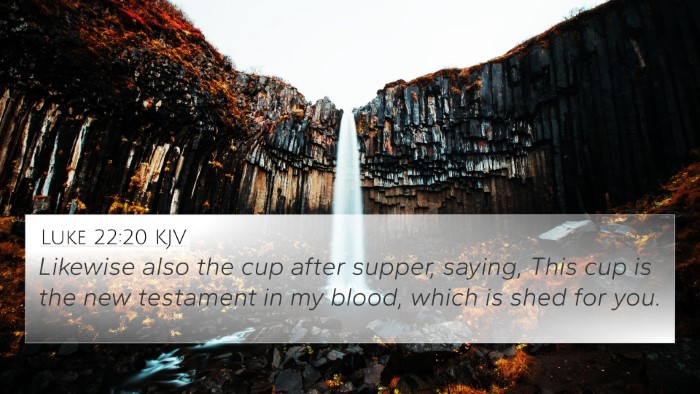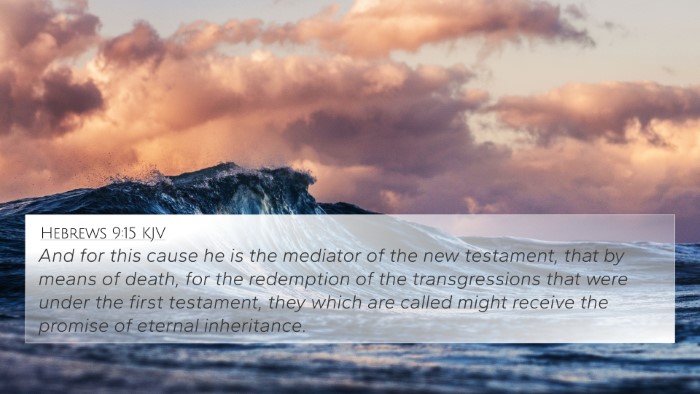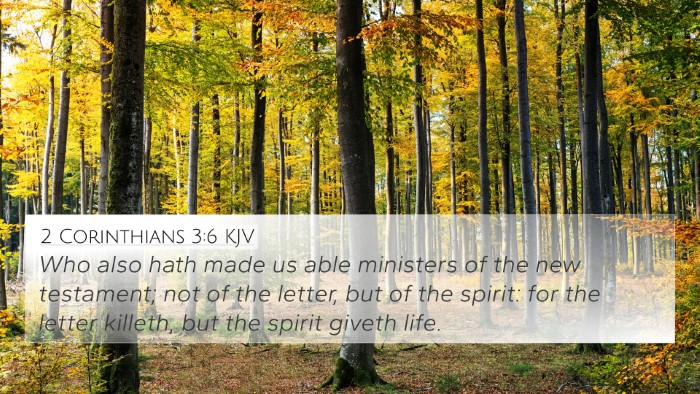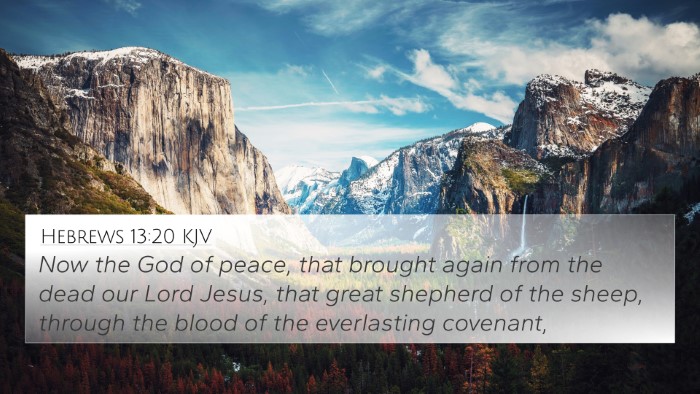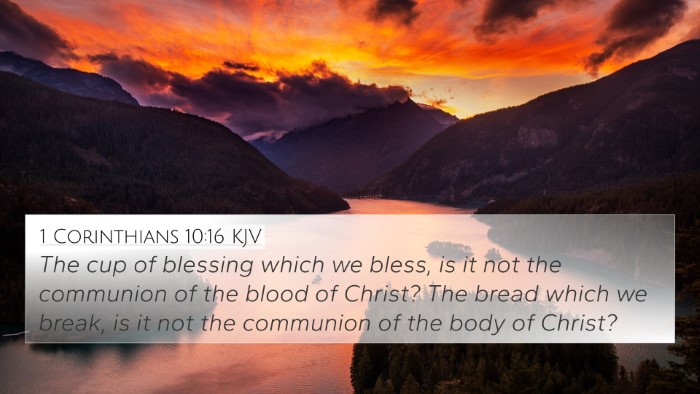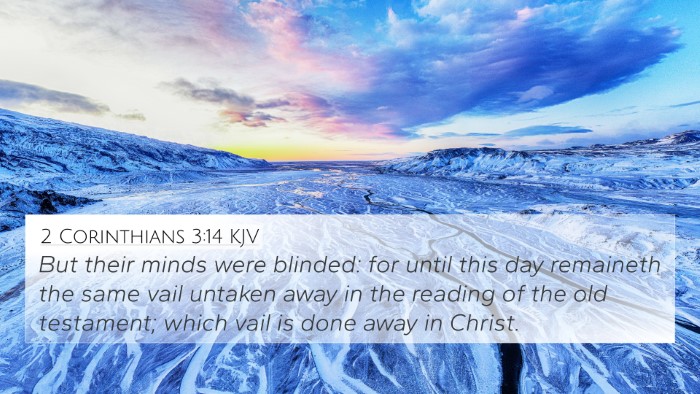Understanding 1 Corinthians 11:25
Verse Text: "In the same way also he took the cup after supper, saying, ‘This cup is the new covenant in my blood. Do this, as often as you drink it, in remembrance of me.’" (1 Corinthians 11:25, ESV)
Verse Meaning and Interpretation
This verse captures the essence of the Christian sacrament of communion (or the Lord's Supper), emphasizing the significance of Jesus' blood as part of the new covenant. The context of this verse is pivotal, as it reflects on the Last Supper – the final meal Jesus shared with his disciples before his crucifixion. The act of drinking from the cup is a remembrance, instilling a deep connection to the sacrifice of Christ.
Historical Context
Before He speaks these words, Jesus has shared the Passover meal, which commemorates Israel's deliverance from Egypt. Here, He redefines the symbols of the meal, presenting Himself as the true Passover lamb, whose blood secures a greater liberation from sin and death.
Comparative Bible Verse Analysis
To fully appreciate 1 Corinthians 11:25, it is beneficial to explore cross-references that connect with themes from the Old and New Testaments. These links foster a rich understanding of the covenantal language Jesus employs:
- Exodus 24:8: "And Moses took the blood and threw it on the people and said, 'Behold the blood of the covenant that the Lord has made with you in accordance with all these words.'" This verse establishes the concept of covenant through sacrificial blood.
- Matthew 26:28: "For this is my blood of the covenant, which is poured out for many for the forgiveness of sins." Here, Jesus directly relates His sacrifice to the new covenant, reinforcing His mission.
- Luke 22:20: "And likewise the cup after they had eaten, saying, 'This cup that is poured out for you is the new covenant in my blood.'" This mirrors Paul's words, affirming the continuity of Paul's teaching with the Gospel accounts.
- Hebrews 9:14-15: "How much more will the blood of Christ, who through the eternal Spirit offered himself without blemish to God, purify our conscience from dead works to serve the living God. Therefore he is the mediator of a new covenant..." This shows how Jesus is the ultimate mediator of the new covenant.
- Isaiah 53:5: "But he was pierced for our transgressions; he was crushed for our iniquities; upon him was the chastisement that brought us peace, and with his wounds, we are healed." This prophetic text prefigures the sacrificial nature of Christ's death.
- Jeremiah 31:31: "Behold, the days are coming, declares the Lord, when I will make a new covenant with the house of Israel and the house of Judah." This reference is foundational in understanding the new covenant concept Jesus inaugurates.
- Romans 5:9: "Since therefore we have now been justified by his blood, much more shall we be saved by him from the wrath of God." This indicates the salvific power of Jesus' blood in the context of justification.
- 1 Peter 1:18-19: "Knowing that you were ransomed from the futile ways inherited from your forefathers, not with perishable things such as silver or gold, but with the precious blood of Christ, like that of a lamb without blemish or spot." This aligns with the sacrificial language used in 1 Corinthians 11:25.
- Revelation 5:9: "And they sang a new song, saying, 'Worthy are you to take the scroll and to open its seals, for you were slain, and by your blood, you ransomed people for God from every tribe and language and people and nation.'" This reveals the universal scope of Christ's sacrifice.
Thematic Bible Verse Connections
The themes of sacrifice, covenant, and remembrance are prevalent throughout the scriptures. 1 Corinthians 11:25 invites believers into a deeper relationship with Jesus through the act of communion and encourages the faithful to remember His sacrifice regularly. Understanding these themes highlights the interconnectedness of biblical texts and the relational dialogue within the scripture.
Inter-Biblical Dialogue
Moreover, the interplay between various biblical texts enhances the understanding of God's redemptive plan.
By linking 1 Corinthians 11:25 with other passages, one recognizes the unity of the scriptures and how God's promises unfold historically through the themes of covenant, sacrifice, and redemption.
Conclusion
In summary, 1 Corinthians 11:25 serves as a profound declaration of the new covenant established by Jesus through His sacrifice. Cross-referencing biblical texts reveals a cohesive narrative about God's plan for humanity, highlighting the significance of Jesus' blood in providing salvation. Engaging in comparative analysis of scripture promotes a richer understanding of its teachings, encouraging believers to delve deeper into the word.
Tools for Bible Cross-Referencing
Utilizing tools for Bible cross-referencing, such as a Bible concordance or a cross-reference Bible study guide, can greatly enhance your study. Here are some methods:
- Bible Concordance: A useful tool that indexes biblical words and phrases to help locate verses and themes.
- Cross-Reference Bible Study: Engaging in a systematic study that involves comparing verses and identifying similarities strengthens one’s understanding.
- Cross-Referencing Themes: Identifying key themes through various scriptures allows for a holistic view of biblical narratives.
- Bible Chain References: Following thematic chains connects diverse scriptural insights for more in-depth studies.
Further Bible Study Resources
To deepen your understanding of cross-referencing biblical texts, consider using resources such as:
- Bible reference materials, which often provide thematic organization to aid in study.
- Comprehensive Bible cross-reference materials that offer extensive lists of connections between scriptures.
- Online tools that facilitate the identification of connections between Old and New Testament texts.
Final Thoughts
Understanding 1 Corinthians 11:25 and its significance requires not only a close reading of the verse but also an exploration of how it interacts with other biblical texts. This inter-Biblical dialogue enriches one’s faith, providing a clearer picture of God’s overarching redemptive narrative.
